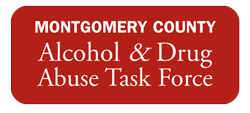
Alcohol and Drug Abuse Task Force
Executive Summary | Abridged Report | Full Report with Appendices
The Montgomery County Alcohol and Drug Abuse Task Force (referred to as the “AOD Task Force”) is pleased to present this Report to Improve Alcohol and Other Drug Abuse and Addiction Services in Montgomery County, Ohio. This document is the culmination of work performed over the last two years by numerous dedicated individuals representing a comprehensive cross-section of the community.
We have learned the following about AOD abuse and addiction in Montgomery County:
- An estimated 42,390 people aged 12 and older needed services for AOD abuse and addiction in 2008 (National Survey on Drug Use and Health: National Findings). In the public system, only 5,106 (12%) of those individuals received assessment services (CrisisCare, FY 2008); only 3,035 (7%) individuals made it to their first treatment appointment; and only 1,032 (2%) completed all of their treatment sessions (ADAMHS Board, FY 2008). While others receive treatment services through the private system, those cannot be calculated due to a lack of data integration between the public and private systems.
- The impact of AOD abuse and addiction is felt across the entire landscape of Montgomery County. A geographic review of drug-related arrest rates, emergency room rates, and mortality rates indicate that the devastation caused by AOD abuse and addiction is evident in every segment of every urban, suburban, and rural neighborhood in our community.
- Montgomery County’s criminal justice population is wrought with individuals struggling with AOD abuse and dependency issues. In fact, as many as 50% of the daily jail population are currently booked with drug charges or have had prior bookings involving drugs. Another 68% of individuals in the Court of Common Pleas system are alcohol and/or drug related. And the entire community pays for this; in 2009, criminal justice accounted for 71% of the County’s General Revenue Fund spending.
Scientific advances over the last 30 years have defined AOD dependence as a chronic relapsing disease with psychological and physiological characteristics. Despite this fact, many continue to believe that addiction is a personal choice and evidence of moral weakness. Stereotypes and stigmas play significant roles in diminishing our community’s ability to respond to this issue; thus, the consequences to individuals, families, and communities are exacerbated.
The efforts of the AOD Task Force have been substantial thus far and the development of this report is its culminating product… but our work is just beginning. Now is the time to cease talking about the community’s problems and begin implementing tangible and realistic community solutions. We urge you to read this report and consider how you play a role. Please join us as we take these first steps towards improving the community’s ability to respond to this vitally important community issue.
Recent News
OhioMHAS Announces Community Innovations Initiative
The Ohio Department of Mental Health and Addiction Services announced it will invest $1.5 million next year in projects that help link non-violent offenders with community-based behavioral healthcare services. The investments into the 12 collaborative projects in 24 counties is part of the Department's new Community Innovations Initiative, which kicked-off last week at the University of Findlay. The funding was acquired through savings resulting from the consolidation of state-funded agencies for mental health and addiction services. ....MoreSuicide Risk Management
There are over 38,000 completed suicides in the United States per year. It is the 10th overall leading cause of death and the 3rd cause of death for individuals aged 15-24. Over 90 percent of those who die by suicide meet criteria for a severe and persistent mental illness and the suicide rate has been increasing, particularly among our veterans and middle aged males. click here for More

